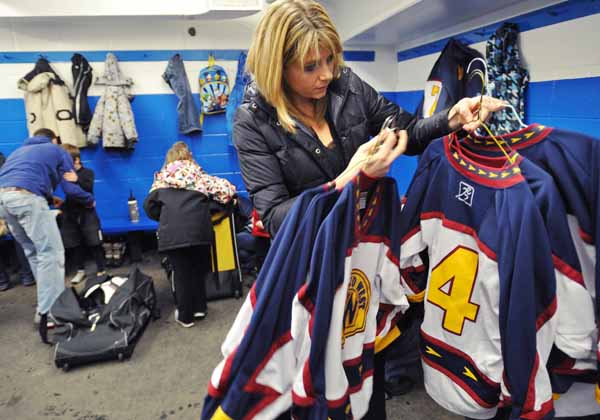It’s a mystery to the players on a minor hockey team exactly how all their games get scheduled, how their jerseys get designed and ordered, how the referees get organized, etc. If the managerial responsibilities of the team are done well, the kids don’t care; they just want to get out on the ice and play. But without a manager, the players would certainly notice– the entire system would fall apart, and the hockey team couldn’t function. But most importantly, the kids wouldn’t have any hockey games to play!
The responsibilities of a Minor Hockey team manager are numerous, and their job is very time-consuming. In fact, the team manager is usually a parent who is volunteering their time for free, which makes the position that much more respectable. But even the other parents of players on the hockey team tend not to appreciate exactly how important and difficult their team manager’s job is. This isn’t because they’re ungrateful or don’t care, but usually because they’re not fully aware of all the responsibilities a manager undertakes. So, to inform the interested hockey player or hockey parent, explained below are some of the most important responsibilities of a Minor Hockey team manager.
First and foremost, a manager makes a coach’s life much easier.
By relieving the coach of planning, logistic, and communication duties, a manager allows the coach to be able to focus on developing the skills of their players. The coach can thereby focus on instructing the players in the most effective way possible, coming up with drills, and providing the players with a rewarding hockey experience.
Arguably the most important responsibility, the manager must create a plan for the entire hockey season, along with the help of the coach. They must develop a practice schedule, help to create a game schedule, apply for tournaments, and plan any additional team events or parties.
A manager must also have continual communication with the other parents of the hockey team.
Once all the schedules are planned and finalized, they need to be communicated to the other parents, usually through email. Additionally, they must be prepared to field any questions or concerns from the parents in person, through email, or over the phone.
Already, the team manager has invested a lot of time in just those two responsibilities. Not to mention, they need to be an effective record-keeper
Firstly, they need to check each player’s eligibility for being on the team, mostly to do with the player’s age. They then need to record each individual player’s registration, contact information and medical information. Finally, they need to submit a game report after each match to their league, detailing things like major penalties and game results.
The manager also has a direct hand in making the hockey games happen. They are responsible for renting the ice, booking the referees, and checking the dressing rooms before and after the games to make sure they are in good condition. They are also responsible for organizing and ordering the appropriate apparel for their team, so the players look sharp out on the ice.
Away games are another issue that managers must contend with. If the hockey teem needs to travel for any extended distance or length of time, the manager is responsible for making a travel plan and relaying any necessary information to the parents. This includes handing out permission slips to parents, taking care of sleeping and meal accommodations, and figuring out the costs associated with the trip.
Closely related to the responsibility of travel planning is the issue of team finances – a manager must organize and keep track of any funds brought in by fundraising efforts, and the associated expenses for buying things for the team with the fundraising money. Furthermore, they need to communicate all the financial information with the other parents, and be able to field finance-related questions as well.
Despite the multitude of responsibilities a manager faces, it is important to keep in mind that they can – and should – delegate some of their tasks to other parents who are willing to take them on. The team can have one parent solely dedicated to keeping track of the finances, and another with the responsibility of booking the ice and the referees, as a couple of examples.
Overall, being a Minor Hockey team manager is a considerable amount of work. And despite the difficulty, and the amount of time and effort required for the position, almost every parent who volunteers for it is happy to do so, and finds it a worthwhile, enriching experience.
This is probably because they know exactly how important the position is, and that they’re enabling the dreams of dozens of kids and their parents to come true: Giving them a time and a place to come together and play hockey, a sport that they love.






